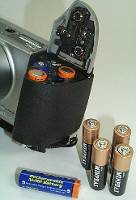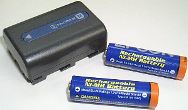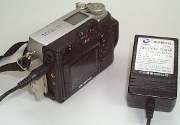| Support | Learning Center | General Imaging Info Digital Camera and Batteries
Most of the power used by a digital camera is used to run the LCD display on the back of the camera. If you can, avoid or limit use of the LCD display. The batteries will last a lot longer. If your camera has an optical viewfinder, try to avoid using the LCD display to line up your shots. Try to avoid reviewing your pictures on the LCD and (if you can) try to stop your friends doing it too! Some brands of batteries do not work well in the high-drain conditions
of a digital camera and will seem to be dead after a short period of use
(ironically they can then be used to power children's toys or other devices
for a long time after they are taken out of the camera!). Use batteries
that a designed for use in high-drain devices or special 'photo batteries'.
Battery manufactures are aware of these problems and change their designs
for these applications. If you use your camera in a fixed location like a studio or office consider using a AC adaptor to supply power to your camera. Some cameras can use rechargeable batteries and although expensive can
save a lot of money in the long run if you take a lot of pictures. In
some cameras you can switch to regular single use batteries when the rechargeable
pack is exhausted. Other models you cannot do this because the rechargeable
battery is a special shape. Low temperatures affect the performance of some batteries. If you plan to take pictures in sub-zero conditions, try to keep the camera (and hence the batteries) warm; perhaps by keeping it in your pocket.
|
 When
using a digital camera make sure you have enough batteries. Digital cameras
use a lot of power, especially if you use the display a lot. Make sure
you take spare batteries and recharge rechargeable batteries before going
out. Also make sure you have enough memory cards to store your photos.
If you use a card reader to read the files into your computer, check that
you have put the card back in the camera before you got to take more pictures!
When
using a digital camera make sure you have enough batteries. Digital cameras
use a lot of power, especially if you use the display a lot. Make sure
you take spare batteries and recharge rechargeable batteries before going
out. Also make sure you have enough memory cards to store your photos.
If you use a card reader to read the files into your computer, check that
you have put the card back in the camera before you got to take more pictures!


